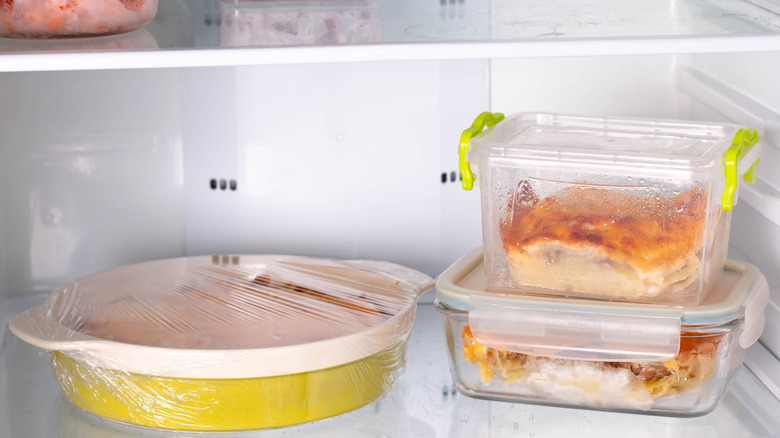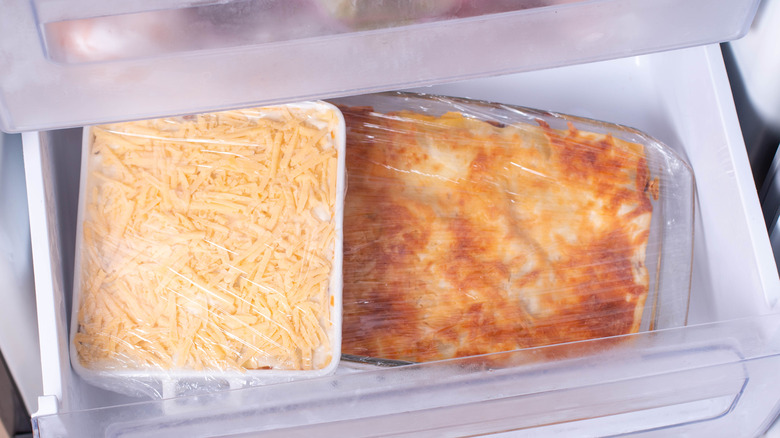How Long Will Tuna Casserole Keep In The Fridge Or Freezer?
A casserole is a dinnertime classic, but we wouldn't bat an eyelash at a casserole served for brunch either. A comfort food thanks to its richness, a casserole is often praised for its versatility and the sheer simplicity it requires during preparation. Of the many hotdish renditions, tuna casserole remains one of the most iconic recipes. If, however, the dish isn't a fixture in your dinner rotation, you're probably wondering how long leftovers will keep. Fridge or freezer, this is how long tuna casserole will last.
In its most basic form, Campbell's shares that the hot dish consists of pasta noodles, canned tuna, and canned soup. To make things a bit more interesting, you can experiment with different pasta noodles or stir in unlikely ingredients like capers or a sprinkle of umami-forward Parmigiano Reggiano. Additionally, you can also elevate tuna noodle casserole by adding some texture with a topping of fried onions, crunchy chips, or crushed, buttery crackers.
While it's rare, sometimes even the tastiest tuna casseroles can't be finished. Luckily, the hotdish makes for great leftovers. But, before you stick that casserole dish in the fridge or freezer, let the food cool so as not to alter its future texture. According to the USDA, quickly cooling food (either by individually portioning or giving baking vessels an ice bath) can also prevent bacterial growth, limiting the risk of foodborne illness. The next question is, how long will the casserole keep?
A few days in the fridge
The life span of leftover tuna casserole will rely largely on how it's being stored, which is why Boat Basin Cafe recommends storing leftovers in an airtight container or resealable bag, rather than simply covering a casserole dish with cling wrap. A tight seal will ensure that bacteria can't reach the casserole in addition to keeping odors from intermingling in your fridge.
Even with the best storage, it's important to remember that there is still a looming expiration date on your tuna casserole. According to Project Meal Plan, a cooked tuna casserole can last for about four days when kept in an airtight container in the refrigerator. However, if there are signs of spoilage like atypical aromas or the presence of mold, then it's wise to dispose of the casserole.
As for how to reheat leftover casserole that's been resting in the fridge, the process is simple. While temperature and cook times can vary based on the size and structure of your tuna casserole, DVO recommends pulling the casserole out of the fridge half an hour before reheating the aluminum foil-covered casserole in a 350 degrees Fahrenheit oven for 30 minutes or until fully heated.
A few months in the freezer
If you know that you won't be eating leftover tuna casserole within the span of a few days, then freezing is the best way to extend the hotdish's shelf life and minimize waste. Much like leftovers kept in the refrigerator, leftover casserole kept in the freezer also benefits from being stored in an airtight container to minimize any potential degradation or freezer burn. Likewise, Stay Healthy Hacks also urges that you label containers with a date to keep tabs on the shelf life of your frozen casserole.
Exceeding days in favor of months, Cook Clean Repeat explains that tuna casserole stored in the freezer can actually keep for about three months without compromising too much on quality. After the three-month cutoff, chances are that your casserole will still be edible, but its taste and texture might start to waver with the passage of time. Again, if there are any signs of spoilage, then it's best to discard the casserole.
When it comes to reheating leftover tuna casserole that's been frozen, Spend with Pennies advises moving the casserole from the freezer to the fridge at least 24 hours before you plan to cook it — plus 30 minutes of rest at room temperature — and then baking until it reaches an internal warmth of 160 degrees Fahrenheit.


